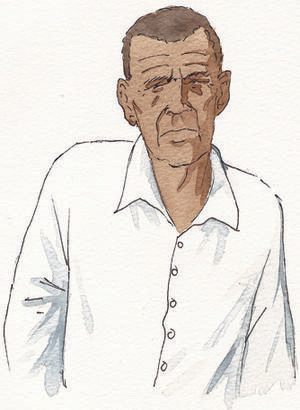Crooks is mentioned prior to chapter four, but his first real appearance is in this chapter. He is portrayed by Steinbeck as not very important, which fits in with when the novel is set, and he is also rather proud.
The fact that Crooks is briefly mentioned before his thorough description suggests that he is not a particularly important character because Steinbeck does not feel the need to describe him before this point.
He has mainly only been mentioned in speech in a negative light because he is black so in some ways, the reader is already prejudiced about Crooks; another reason why Steinbeck has waited to introduce him properly.
‘Crooks was a proud, aloof man’ ‘He kept his distance and demanded that other people kept theirs.’ These two quotations are very significant in presenting Crooks’ character to the reader.
The fact that Steinbeck writes that he ‘demanded’ that he was left alone shows that he tried to ignore the segregation which happened against black people in America at this time by pretending it was him who wished not to mix with white people rather than the opposite.
From ‘proud’ and ‘aloof’ we can infer that Steinbeck is conveying Crooks as a man who is angry about segregation and feels that it is unfair but is going to hide his real feelings and put on a false face.
Despite his pride, Steinbeck shows that he is actually very lonely and wishes that he had more company. ‘His tone… more friendly’ insinuates that even though he distanced himself from the others in general, he really did enjoy the company and so he was very tolerant of Lennie when Lennie came to talk to him.
He also felt happy that someone was not ignoring him but choosing to speak to him, this in itself shows that Crooks is key to the theme of loneliness as he is even pleased about Lennie, who doesn’t understand racism, coming and talking to him.
It is also insinuated that he is very keen that his rights are upheld; ‘a mauled copy of the California civil code for 1905.’ The fact it is so old suggests has Crooks thinks it is important because he has kept hold of it all this time, it could also mean that he does not have the chance to buy new things as he has not been able to get a more up to date one.
Another inference could be that he feels his rights were better then, but this is unlikely. ‘Mauled’ must be noted because it conveys violence so the reader wonders if others have tried to destroy it to give Crooks even fewer rights. It also adds to the idea of it being old. Steinbeck has included this to show that Crooks really does feel that he is just as important as the others no matter what they think and is keen that his rights are not overlooked.
He regularly repeats the word ‘rights’ in the opening of chapter four; ‘nobody got any right in here but me’ and ‘I got a right,’ shows that Steinbeck has made him very anxious about his rights. He has done this to point out to people that black people did not have many rights in 1920s America.
Context is extremely important with the character, Crooks because during the Great Depression America was a very prejudiced country and segregation happened everywhere. Crooks is not allowed to sleep with the other workers and Steinbeck has made it clear that his accommodation is not really fit for any human. ‘Little shed that leaned off the… barn’ supports many important ideas.
Firstly, that Crooks is like an animal because he sleeps next to the barn, also he cannot be important if he lives in a shed. The word little especially shows that they don’t want to waste money or space on a black man. Another keyword is ‘leaned’ which means that it was of very bad quality and so nobody cares for Crooks or puts any effort into where he sleeps.
Steinbeck has included Crooks to represent black people in America and show how they were treated. It appears likely that Steinbeck is against segregation and is trying to shock the reader with the way Crooks is treated by the other characters in the novel.
In ‘of Mice and Men’ light is used by Steinbeck to symbolize hope on many occasions. Crooks’ room has ‘a meager yellow light’ which suggests that there is very little hope in Crooks’ life. This is the case because he is black and so nobody cares for him.
In conclusion, we are able to learn a great deal about Crooks in these pages all of which is there to remind us of the awful thing which was segregation. It shocks the reader and makes them feel uncomfortable. We learn that Crooks is proud and feels unjustly treated.


this is actually very helpful in many ways!